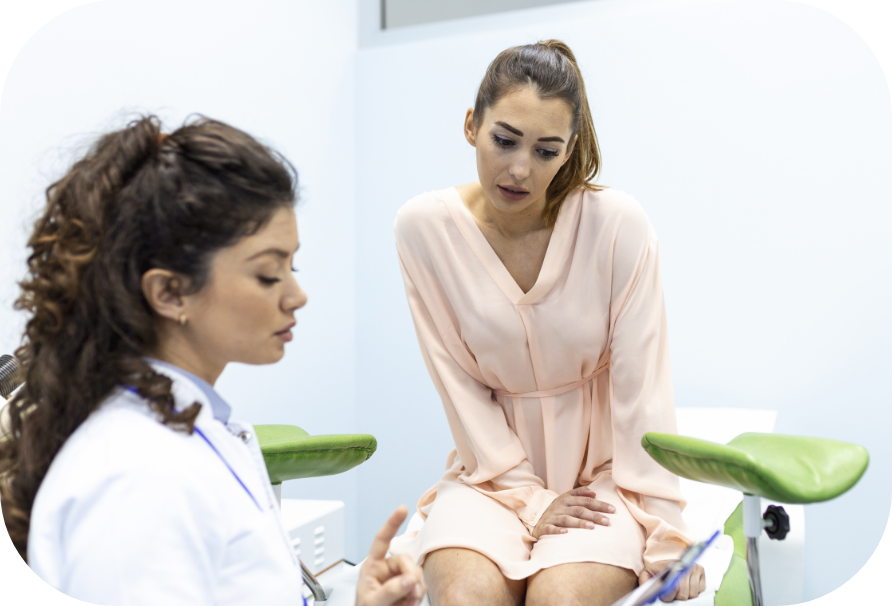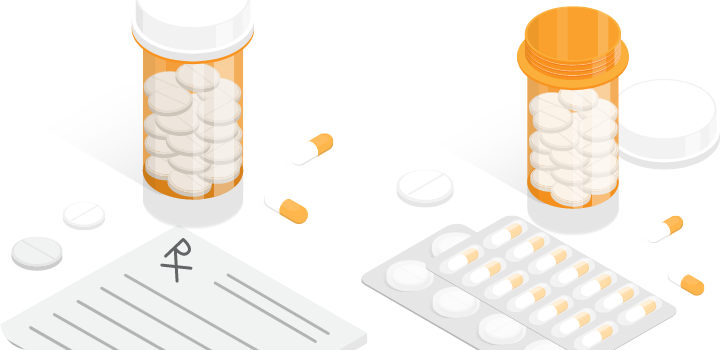Women’s Health FAQs Answered: A Comprehensive Guide
May 22, 2024 | 10 minute read
As a woman, taking care of your health should be a top priority, but it’s common to have questions and concerns. That’s why we’ve compiled this comprehensive blog to address some of the most frequently asked questions around women’s health
1.What is necessary to access sexual and reproductive health?
Access to sexual and reproductive health is crucial for every woman, encompassing a wide range of services that should be readily available and easily accessible. This includes regular gynecological check-ups, family planning advice, access to contraceptive options, sexually transmitted infection (STI) screenings, and pregnancy care among other services. Ensuring confidentiality, respect, and non-discrimination is foundational to providing these services.

2.How can I achieve optimal well-being as a woman?
Achieving optimal well-being as a woman encompasses a holistic approach to health, integrating physical, mental, and emotional aspects. It begins with consistent preventive care, including regular health screenings and vaccinations tailored to women’s unique health needs. Nutritional balance, regular physical activity, and adequate sleep form the pillars of maintaining good physical health.
Furthermore, mental wellness and emotional wellness should not be overlooked; stress management, cultivating a supportive community, & seeking professional help when needed are essential components. DiRx understands the importance of personalized care and advocates for a comprehensive health plan that addresses the individual needs of each woman, promoting a balanced lifestyle for optimal well-being.
3.Is it possible for a woman to become pregnant and breastfeed simultaneously?
Yes, it is indeed possible for a woman to become pregnant while breastfeeding. Breastfeeding can delay the return of normal ovulation and menstrual cycles, but it is not a reliable method of contraception. Many women experience a natural period of infertility while breastfeeding, known as lactational amenorrhea. However, this does not guarantee the prevention of pregnancy. It is essential for women who are breastfeeding & wish to avoid pregnancy to discuss contraception options with their healthcare provider.
4.What steps can I take to prioritize my sexual and reproductive health?
Prioritizing your sexual and reproductive health is a crucial step towards maintaining overall well-being. The first step is to establish a relationship with a healthcare provider you trust and feel comfortable discussing your sexual and reproductive health with.

Regular check-ups and screenings, such as Pap smears and mammograms, are essential for early detection of potential health issues. It is also important to educate yourself about your body and its functions, understanding the signs of normal and abnormal conditions. Additionally, practicing safe sex, including the use of contraception to prevent unwanted pregnancies and STIs, is fundamental. DiRx encourages open communication with healthcare professionals and offers a variety of resources and services to support women in making informed decisions about their sexual and reproductive health.
5.What are some common symptoms of menopause, and how can I manage them?
Menopause marks a significant transition in a woman’s life and is accompanied by a variety of physical & emotional symptoms due to changing hormone levels. Common symptoms include hot flashes, night sweats, mood swings, sleep disturbances, and vaginal dryness. Managing these symptoms effectively often requires a holistic approach tailored to each individual’s needs. Lifestyle modifications such as maintaining a healthy diet, engaging in regular physical activity, & practicing stress-reduction techniques like meditation & yoga can significantly alleviate symptoms. Additionally, it’s important to have open dialogues with healthcare providers about hormone replacement therapy (HRT) and other treatments that may be appropriate. DiRx supports women navigating menopause by providing access to resources, care, and treatment options that prioritize holistic well-being.

6.What are some common gynaecological conditions, and how can they be treated?
Gynecological conditions affect many women throughout their lives and can range from mild to severe, impacting their overall well-being and quality of life. Common gynecological issues include endometriosis, polycystic ovary syndrome (PCOS), fibroids, and cervical dysplasia. Treatment options vary based on the condition and its severity but may include medications like hormonal therapy, pain management strategies, and in some cases, surgical interventions.
Lifestyle modifications and supportive therapies such as physical therapy or acupuncture can also be effective in managing symptoms. It’s crucial for women to undergo regular gynecological exams to detect any issues early and discuss potential treatments with their healthcare providers. DiRx provides access to a range of healthcare services and information, helping women to actively manage their gynecological health with informed choices and professional support.
7.How can I maintain a healthy weight as a woman?
Maintaining a healthy weight is crucial for overall health and well-being, especially as it can help prevent a variety of chronic diseases. Women can achieve and maintain a healthy weight by adopting a balanced diet rich in fruits, vegetables, whole grains, and lean proteins while limiting processed foods and sugars. Regular physical activity, such as cardio, strength training, and flexibility exercises, also plays a significant role in weight management. It’s important to set realistic goals and create a sustainable routine that fits into your lifestyle. Additionally, consider seeking support from healthcare professionals, nutritionists, or fitness experts who can provide personalized advice and guidance. DiRx emphasizes the importance of a holistic approach to weight management, recognizing that emotional and mental health contribute significantly to physical health outcomes.
8.What are some common breast health concerns, and how can they be addressed?
Common breast health concerns include breast pain, lumps or changes in the breast tissue, and breast cancer. It’s essential to perform regular breast self-exams and to schedule clinical breast exams and mammograms as recommended by your healthcare provider. If you notice any changes in your breast health, such as new lumps or nipple discharge, it’s important to seek medical attention promptly for further evaluation.

9.How can I support my mental health as a woman?
Supporting your mental health involves taking care of your emotional well-being and seeking support when needed. You can try techniques such as mindfulness, meditation, exercise, and spending time with loved ones to help manage stress and improve your mood. If you’re experiencing persistent feelings of sadness, anxiety, or other mental health concerns, don’t hesitate to reach out to a mental health professional for support and guidance.
10.What are the different types of contraception available to women?
There are several types of contraception available to women, including birth control pills, patches, injections, implants, intrauterine devices (IUDs), and barrier methods such as condoms and diaphragms. Each method has its own benefits and considerations, so it’s important to discuss your options with your healthcare provider to determine the best choice for you.
10.What are the different types of contraception available to women?
There are several types of contraception available to women, including birth control pills, patches, injections, implants, intrauterine devices (IUDs), and barrier methods such as condoms and diaphragms. Each method has its own benefits and considerations, so it’s important to discuss your options with your healthcare provider to determine the best choice for you.
11.What is polycystic ovary syndrome (PCOS), and how is it diagnosed and treated?
Polycystic ovary syndrome (PCOS) is a hormonal disorder that affects women of reproductive age. It is characterized by irregular menstrual periods, excess hair growth, acne, and polycystic ovaries. PCOS can be diagnosed through a combination of medical history, physical examination, and laboratory tests. Treatment options may include lifestyle changes, medications to regulate menstrual cycles, and fertility treatments for women trying to conceive.
12.What are the benefits of regular exercise for women’s health?
Regular exercise offers numerous benefits for women’s health, including improved cardiovascular health, weight management, stress reduction, and mood enhancement. It can also help prevent chronic diseases such as heart disease, diabetes, and osteoporosis. Aim for at least 150 minutes of moderate-intensity exercise per week, along with strength training exercises at least two days per week.
13.How can I improve my sleep quality as a woman?
Improving sleep quality involves practicing good sleep hygiene habits, such as maintaining a regular sleep schedule, creating a relaxing bedtime routine, and creating a comfortable sleep environment. Avoiding stimulants such as caffeine and electronics before bedtime and limiting exposure to bright light can also help improve sleep quality. If you continue to experience sleep disturbances, consider discussing them with your healthcare provider.
14.What is endometriosis, and how is it diagnosed and treated?
Endometriosis is a condition in which the tissue that normally lines the inside of the uterus grows outside the uterus, causing pain, infertility, and other symptoms. It can be diagnosed through a combination of medical history, physical examination, and imaging tests. Treatment options may include pain medication, hormone therapy, and surgery to remove abnormal tissue.
15.What is osteoporosis, and how can I prevent it?
Osteoporosis is a condition characterized by weakened bones that are more prone to fractures. It is most common in postmenopausal women due to hormonal changes that affect bone density. You can help prevent osteoporosis by consuming an adequate amount of calcium and vitamin D, engaging in weight-bearing exercise, avoiding smoking and excessive alcohol consumption, and discussing bone health with your healthcare provider.
16.How can I maintain healthy skin as a woman?
Maintaining healthy skin involves practicing good skincare habits, such as cleansing your skin regularly, moisturizing, protecting it from the sun with sunscreen, and avoiding excessive sun exposure. Eating a balanced diet rich in fruits, vegetables, and healthy fats can also support skin health. If you have specific skin concerns, consider consulting a dermatologist for personalized recommendations.
17.What are some common signs of cervical cancer, and how can it be prevented?
Common signs of cervical cancer include abnormal vaginal bleeding, pelvic pain, and pain during intercourse. Cervical cancer can be prevented through regular screening with Pap smears and HPV testing, HPV vaccination, and avoiding high-risk sexual behaviors. Early detection and treatment are key to improving outcomes for women diagnosed with cervical cancer.
18.How can I support my reproductive health during pregnancy and childbirth?
Supporting your reproductive health during pregnancy and childbirth involves receiving regular prenatal care, eating a balanced diet, staying active, and avoiding harmful substances such as alcohol and tobacco. It’s essential to communicate openly with your healthcare provider about any concerns or symptoms you may experience during pregnancy and to follow their recommendations for a healthy pregnancy and delivery.
19.What are the symptoms of urinary tract infections (UTIs), & how are they treated?
Common symptoms of urinary tract infections (UTIs) include frequent urination, burning during urination, and pain or discomfort in the lower abdomen. UTIs are typically treated with antibiotics prescribed by your healthcare provider. Drinking plenty of water, urinating frequently, and practicing good hygiene can help prevent UTIs.
20.What are the benefits of breastfeeding for both mother and baby?
Breastfeeding offers numerous benefits for both mother and baby. For babies, breast milk provides essential nutrients and antibodies that help protect against infections and diseases. Breastfeeding also promotes bonding between mother & baby & may reduce the risk of certain health conditions later in life. For mothers, breastfeeding can help promote postpartum recovery, reduce the risk of breast and ovarian cancer, and support weight loss.
21.What are some common myths and misconceptions about women’s health?
There are many myths and misconceptions surrounding women’s health, such as the belief that birth control pills cause weight gain or that women don’t need regular pelvic exams if they’re not sexually active. It’s essential to separate fact from fiction and rely on evidence-based information when making decisions about your health. If you’re unsure about something, don’t hesitate to ask your healthcare provider for clarification.
22.How does stress affect women’s health, and what are some coping strategies?
Stress can have a significant impact on women’s health, affecting both physical and mental well-being. Chronic stress has been linked to an increased risk of heart disease, obesity, depression, and other health problems. Coping strategies for managing stress may include mindfulness meditation, deep breathing exercises, regular exercise, and seeking support from friends, family, or a mental health professional.
23.What are some common signs of perimenopause, and how can I manage them?
Perimenopause is the transitional phase leading up to menopause, during which women may experience symptoms such as irregular periods, hot flashes, night sweats, mood swings, and vaginal dryness. To manage these symptoms, you can try techniques such as hormone replacement therapy, lifestyle changes, and alternative therapies like acupuncture or herbal supplements. It’s essential to discuss your symptoms with your healthcare provider to determine the best treatment options for you.
24.How can I support my bone health as a woman?
Supporting bone health involves consuming an adequate amount of calcium and vitamin D through diet and supplements if necessary, engaging in weight-bearing exercise, avoiding smoking and excessive alcohol consumption, and discussing bone health with your healthcare provider. Regular bone density screenings may also be recommended, especially for postmenopausal women at higher risk of osteoporosis.
Conclusion:
We hope this comprehensive guide answers some of the common questions around women’s health and provides valuable insight to empower more women in taking proactive steps to their well-being. For a more detailed understanding, please reach out to your healthcare provider.

Understanding Euthyrox® (Levothyroxine): Your Comprehensive Guide to Thyroid Health
May 15, 2024 | 5 minute read

Prioritising Heart Health: A Vital Guide for Women in America
In the bustling rhythm of American life, women often prioritize everyone else’s health over their own. Yet, here’s a sobering fact: heart disease is the leading cause of death among American women, surpassing all types of cancer combined.
May 3, 2024 | 5 minute read

Your guide to Healthy Living:
Managing Diabetes
Whether you’ve recently been diagnosed or have been living with diabetes for years,
Feb 19, 2024 | 5 minute read

Understanding a Drug’s Journey to Generic Production
In today’s healthcare landscape, the rising costs of prescription medications have become a significant
July 18, 2023 | 3 minute read

Revolutionizing Women’s Healthcare: Empowering Women’s Health with DiRx
Here at DiRx Health, we’re on a mission to empower women to take control of their health and well-being.
March 8, 2023 | 5 minute read

Five reasons every woman needs an annual visit with a primary care provider
May 10, 2022 | 3 minute read

Get relief from pollen allergies
Learn ways to help prevent pollen allergies and how to ease the symptoms
July 18, 2023 | 3 minute read

Introducing Kyzatrex: A safe, effective and painless option for Testosterone Replacement Therapy
Aug 14, 2023 | 4 minute read

Counting the Cost
The Financial Burden of Living with Chronic Conditions
May 16, 2023 | 3 minute read

3 ways to make filling a prescription easier
If you wish your pharmacy experience was a smoother and more pleasant one, here are a few ideas that can help
April 11, 2023 | 3 minute read

For the Love of Black History
Striving for a healthier future through accessibility
February 14, 2023 | 4 minute read

Falling out-of-network with your pharmacy
Why this happens and protecting your bottom line
December 13, 2022 | 5 minute read

Take control of your personal healthcare decisions
Options to consider for the new year
November 14, 2022 | 5 minute read

How parents can lighten the impact of the impending Adderall shortage
Tips from our DiRx Pharmacy Team
October 18, 2022 | 2 minute read

The HSA, HRA and FSA – understanding the difference
Are you taking full advantage of your benefit?
October 03, 2022 | 2 minute read

A pharmacist's perspective on the challenges patients are facing today.
An interview with Rima Arora, PharmD, RPh, Director of Pharmacy at DiRx
August 24, 2022 | 4 minute read

What can we do about the soaring cost of prescription medicine?
An interview with Satish Srinivasan, DiRx Founder and Chief Executive Officer
July 22, 2022 | 6 minute read

Is a prostate cancer screening right for you?
Learning more about prostate cancer screening risks and benefits can help you decide if it's right for you
June 8, 2022 | 4 minute read

How Safe is your prescription information online
Your prescriptions are part of your protected health information. Understand how it is used, shared and protected
May 25, 2022 | 3 minute read

Choosing an online pharmacy you can trust
Not all pharmacies are the same. Choosing one that you can depend on with your medicines and your health are important
April 13, 2022 | 3 minute read

5 reasons that choosing an online pharmacy may be right for you
Lots of people are discovering the benefits of choosing an online pharmacy for their prescription drug needs
March 30, 2022 | 3 minute read

Should you consider switching from brand-name to generics?
Being an informed healthcare consumer includes doing your homework when it comes to making decisions
March 16, 2022 | 3 minute read

AI in Healthcare - Part 1: The Future of Medical Diagnosis & Treatment
Imagine a world where robots perform surgery, AI diagnoses diseases with superhuman accuracy, and virtual assistants manage your medications.
June 3, 2024 | 5 minute read

EUTHYROX®, a branded
Levothyroxine is also available.
Tap here to know more
Buying Kyzatrex for the first time?
Use code FREETRIAL to get a 1 month supply of Kyzatrex for FREE






